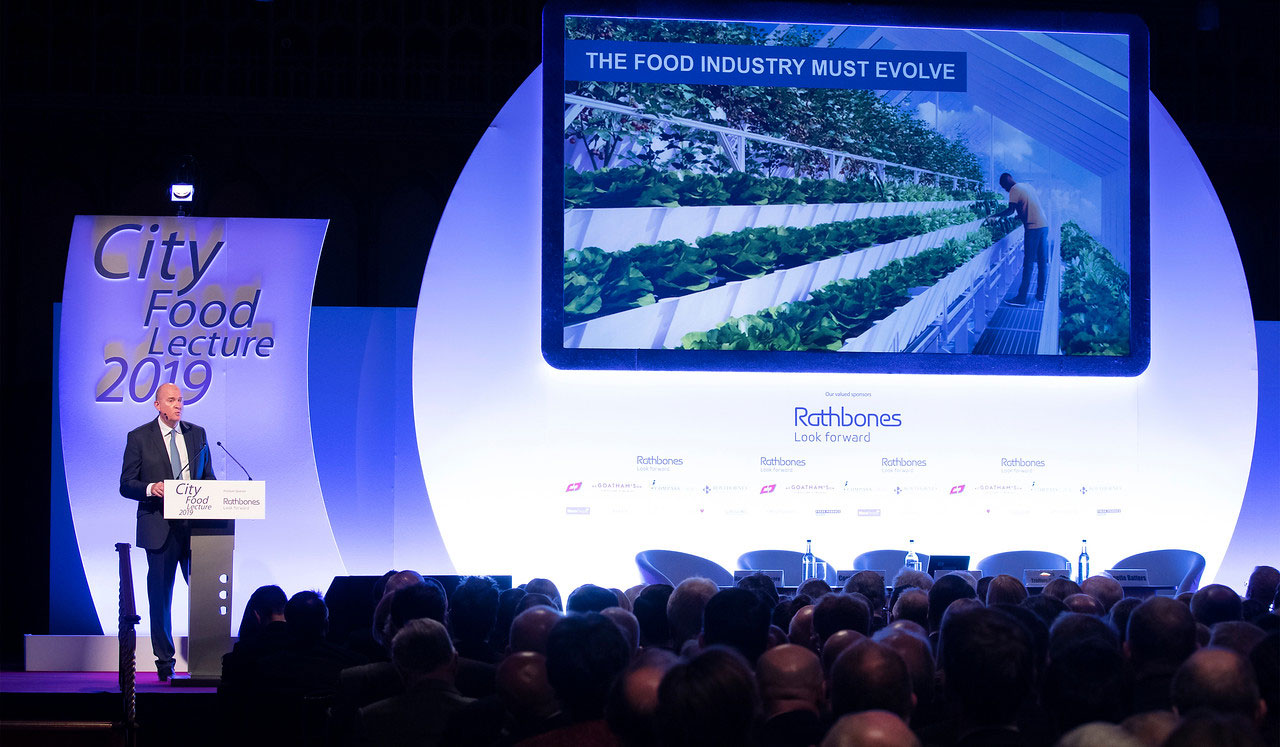
Trust and Tech - key drivers of the food industry in 2050?
Dominic Blakemore, Chief Executive of Compass Group, delivered this year’s keynote City Food Lecture entitled ‘Trust & Tech – the future of food’, providing his insights into what the food industry might look like in 2050. Based on the trends and technologies that are evolving today, he painted a picture of a time when the world’s population is expected to have grown to over 9 billion people, living in a world that is wealthier, more demanding and increasingly digital.
Acknowledging that impact on the environment and public health would still be critical issues for the food industry, he stressed that there were huge opportunities ahead but with a need to think differently to avoid further damaging the planet and to create a healthier and more sustainable world.
‘Millennials’ were cited as the key drivers of change, often described as the ‘me, me, me generation’ whilst also being open-minded, liberal and passionate about equality. He looked further ahead to the influence of ‘Generation Z’, a more resilient generation with a higher self-belief and a different outlook. ‘Generation C’ was mentioned as a powerful new force, defined not by age but by attitude and mindset. Also referred to as the ‘YouTube’ generation, these consumers are trend makers who place high value on community.
Some of the trends of these consumer groups:
Food is becoming about social identity and individual expression
The experience of eating out is often more important than the food itself
Other growing themes are health and wellness, veganism and urbanisation.
Trust, in particular trust in businesses, was described as “the currency of the next decade”, with recent surveys showing that 6 out of 10 consumers won’t buy from companies they don’t trust and 9 out of 10 millennials looking for companies with whom they share values. The way to build this trust, he suggested, was through transparency and sustainability, which includes paying a fair price for goods, caring about workers’ rights, prioritising animal welfare and protecting resources.
The more worrying trends highlighted in the lecture included today’s obesity rates that are creating a national health crisis, rising inequality in society, poor diets in children and a rise in both food miles and waste.
So, what needs to change?
Locally produced food should be embraced, educating children from a young age about ‘farm to fork’ and creating relationships between farmers and consumers
With a global demand for protein expected to increase by 80%, we need to be eating more plant-based protein
Future initiatives need to be more future-proof as today’s agriculture model sees a third of food being wasted in the supply chain
Partnerships between growers, suppliers and those who serve consumers will become increasingly important with ‘big data’ enabling these partnerships to accurately link demand with supply.
Moving onto the subject of technology, he explained that the food industry has been slow to adopt new technologies, however advances in robotics are starting to have an impact. The example he gave was ‘Mr Flippy’, the burger flipper which is being used in sports stadiums in the US and is now proving to be more efficient than humans.
While science and technology will inevitably play a much bigger part in the future of food production, he commented that the pace of change made it impossible to predict future technologies. Augmented reality, however, was highlighted as a likely next big thing. He gave the example of the ‘Spyce’ robotic restaurant, which programs taste preferences to predict food desires - “Consumers will get projected 360-degree visualisations of food right in front of their eyes.”
Developments in Artificial Intelligence could mean that we have a ‘digital self’ to store our medical and dietary information along with our taste preferences. 3D printing could also have huge impact on food - “If it can be pureed, it can be printed” – making it a potential reality that we could see food robots downloading a recipe for consumers to 3D print the meal from cartridges of ingredients.
Although very impressive ideas, there was an obvious feeling in the audience that this use of technology could actually take the joy out of eating!
To conclude the lecture, Blakemore stressed that the food industry needed to evolve, with the speed of change determining which businesses survive. He asked for a change in mindset across the industry and a willingness to collaborate – “no business can tackle this challenge on its own”.
MorePeople were a proud sponsor of the City Food Lecture.
Photo courtesy of City Food Lecture 2019
